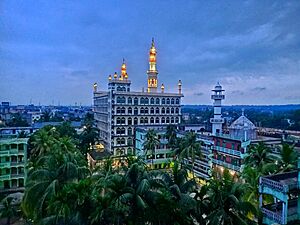Abdul Hamid Madarshahi facts for kids
Quick facts for kids Abdul Hamid |
|
|---|---|
| Religion | Islam |
| Denomination | Sunni |
| Alma mater | Mohsinia Madrasa |
| Personal | |
| Born | 1869 North Madarsha, Hathazari, Chittagong District |
| Died | 31 March 1920 (aged 50–51) Bengal Province |
| Parents |
|
| Religious career | |
| Students | Muhammad Faizullah |
| Influenced | Shah Ahmad Hasan |
| Arabic name | |
| Personal (Ism) | ʿAbd Al-Ḥamīd عبد الحميد |
| Patronymic (Nasab) | ibn Rustam ʿAlī بن رستم علي |
| Epithet (Laqab) | Fakhr al-Islām فخر الإسلام |
| Toponymic (Nisba) | Al-Shaykh الشيخ Al-Madarshahi المدرشحي |
Abdul Hamid Madarshahi (born 1869, died March 31, 1920) was an important Islamic scholar and teacher from Bengal. He was also known as Fakhr al-Islām ʿAbd al-Ḥamīd ibn Rustam ʿAlī al-Madārshāhī.
He helped bring the Deobandi movement to Bengal. He is also famous for being one of the people who started Al-Jamiatul Ahlia Darul Ulum Moinul Islam in Hathazari. This school became a very important place for Islamic learning.
Contents
Early Life and Learning
Abdul Hamid Madarshahi was born in 1869 in a respected Muslim family. His family lived in a village called North Madarsha in Hathazari, which was part of Chittagong District in Bengal Presidency. His parents were Sheikh Rustam Ali Munshi and Begum Suajan.
His family's history goes back to Sheikh Muhammad bin Hafeez. He was an Arab Muslim who came to Chittagong many centuries ago. He settled there and became a local landowner. Later, due to a sickness in the area, his family moved to different villages. Abdul Hamid's ancestor, Sheikh Shamsher Ali Taluqdar, finally settled in Madarsha.
Abdul Hamid started his education at home. Then, he went to a local maktab, which is a traditional school for religious education. There, he learned the Qur'an. After that, he attended a primary school. He later joined the Mohsinia Madrasa in Chittagong city. People say he was a very bright student and always came first in his class exams at Mohsinia Madrasa. He studied many important religious books there.
His Work and Contributions

While studying at Mohsinia Madrasa, Abdul Hamid Madarshahi met Abdul Wahid Bengali. He was greatly inspired by him and joined his efforts to improve society. Abdul Hamid took part in many religious discussions and debates. He became known as a skilled debater. Because of his knowledge and debate skills, he was given special titles. These titles were Fakhr al-Islām (meaning 'Glory of Islam') and Munāẓir-e-Islām (meaning 'Debater of Islam').
From a young age, he started a small maktab in Khandaqia. Here, he taught religious lessons to both children and older people. He also helped set up similar schools in other areas.
In 1896, he worked with Abdul Wahid Bengali, Sufi Azizur Rahman, and Habibullah Qurayshi to start a big madrasa. This school was named Al-Jamiatul Ahlia Darul Ulum Moinul Islam. They realized how important it was to have such a school in Bengal at that time. Local people also helped them build this madrasa. Abdul Hamid Madarshahi also founded another large madrasa in Fatehpur. It was called al-Jāmiʿah al-Ḥamīdiyyah Nāṣir al-Islām.
His Writings
Abdul Hamid Madarshahi wrote several books about Islam. Some of his important works include:
- Tuḥfah al-Mu'minīn (A Gift to the Believers)
- Masā'il-i-Ramaḍān (Issues about Ramadan)
- Faḍā'il-i-ʿĪdgāh (Good things about the Eidgah, a place for Eid prayers)
- Faḍā'il-i-Iʿtikāf (Good things about Iʿtikāf, a spiritual retreat)
Later Life and Legacy
Abdul Hamid Madarshahi passed away on March 31, 1920. He had two sons: Allama Sheikh Muhammad Ismail and Mufti Sheikh Muhammad Yusuf. His work in education and spreading Islamic knowledge left a lasting impact.
See Also
- List of Deobandis
 | Frances Mary Albrier |
 | Whitney Young |
 | Muhammad Ali |

